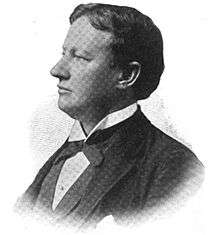Thomas J. Clunie
Thomas Jefferson Clunie (March 25, 1852 – June 30, 1903) was a U.S. Representative from California.
Thomas J. Clunie | |
|---|---|
 Thomas Jefferson Clunie | |
| Born | March 25, 1852 St. John's, Newfoundland |
| Died | June 30, 1903 (aged 51) |
| Occupation | Politician |
Clunie was born in St. John's, Newfoundland on March 25, 1852, while his parents were on a visit there from Massachusetts. Clunie moved with his parents to California in 1854. Clunie moved again to Maine, and then went back to California in 1861 and attended public schools in Sacramento. Upon graduation, he studied law under the tutelage of a Harvard College graduate. He was admitted to the bar in 1868, before the age of majority, under a special act of the legislature.[1] He began his law practice in Sacramento in 1870.
Political life
He served as member of the State assembly in 1875. He served as delegate to the Democratic National Convention in 1884. He served in the State senate 1887-1889. He worked for the state militia, commanded the 4th Brigade, National Guard of California,[1] before he retired as brigadier general.
Clunie was elected as a Democrat to the Fifty-first Congress. He served from March 4, 1889 to March 3, 1891. He was unsuccessful running for reelection in 1890 to the Fifty-second Congress. He resumed the practice of his profession. He died in San Francisco, California, on June 30, 1903. He was interred in the Sacramento Historic City Cemetery in Sacramento, California.[2]
References
- Oscar Tully Shuck, ed. (1901). History of the Bench and Bar of California: Being Biographies of Many. Los Angeles, California: Commercial Printing House. pp. 804–805. Retrieved May 14, 2017.
- "Clunie, Thomas Jefferson". Biographical Directory of the United States Congress. Retrieved May 5, 2011.

| U.S. House of Representatives | ||
|---|---|---|
| Preceded by Charles N. Felton |
Member of the U.S. House of Representatives from California's 5th congressional district 1889–1891 |
Succeeded by Eugene F. Loud |
![]()